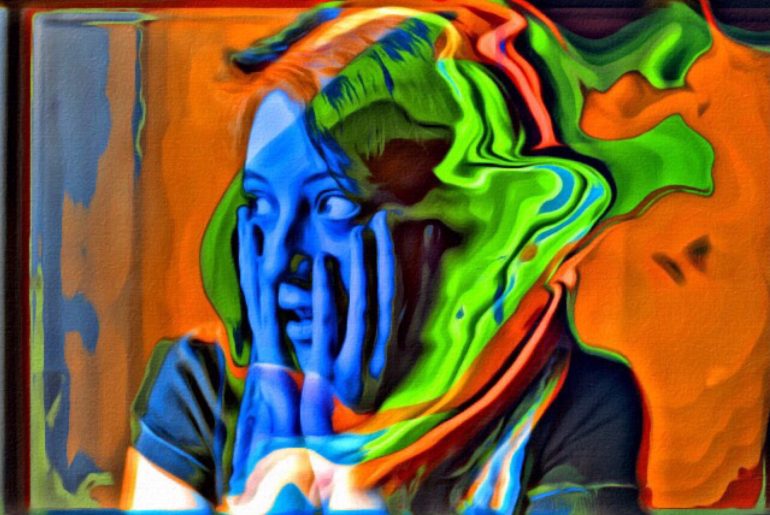This post is part of the series Anxiety
Other posts in this series:
- The rawness of panic attacks (Current)
- Anxiety myths busted
My patients tell me that panic attacks are not pleasant. They describe it more as sheer terror. They fear dying, losing control or going insane. Panic attacks come on hard, peak fast and usually pass within the hour. They create such a fracture in the sufferer’s psyche that the hangover feeling of having been overwhelmed and the fear of another attack can put a dampener on life plans.
Panic attacks can happen to anyone. It does happen to about 10% of us. If they recur and the sufferer starts making their life smaller to avoid situations which might trigger an attack, then a panic disorder can be diagnosed.
Patients often end up in emergency rooms with their first attack. An attack is so awful and so overwhelming, with such a huge physical component of racing heart, tight chest, shortness of breath, sweating and the sense of the world tunnelling in on you, that sufferers are sure that they are having a heart attack or a stroke. To end up at the doctor is good because, although panic attacks aren’t in themselves dangerous, they do deserve a thorough physical workup. Panic attacks might be triggered by a physical reason, such as an endocrine problem or a heart irregularity.
Patients tell me that the worst thing about a panic attack is that you are completely helpless as to when they will strike and how you can manage them. This is not entirely true since it is possible to understand, manage and even reduce panic attacks.
The meds are a godsend:
- Benzodiazepines (“benzos”) are the mainstay of breaking a panic attack. My well-controlled panic disorder patients walk around with a benzo in their bags for years without using them. Just knowing that it is there in an emergency reduces the anxiety tone. Benzodiazepines work fast and effectively. They are great. Unfortunately, they are also addictive. Thus, if you use them too often for too long, you can get addicted to them. That is a mess. Suddenly you need more and more for the same effect (tolerance) and can trigger an attack if you don’t use them (withdrawal). That is why it is important to be properly assessed by a doctor before using them.
- If the attacks are happening often, an SSRI (serotonin reuptake inhibitor) or another antidepressant could be most useful. These drugs are called antidepressants, but they are so useful in treating anxiety disorders they could just as easily be called anti-anxieties.
Your body connection:
- Hypoglycemia (a blood sugar drop) presents with symptoms of racing heart, shaking, sweating and feeling faint. If you are anxious, your brain can interpret these sensations as having a panic attack. As soon as you think you are having a panic attack, you probably will be having one. My savvy patients carry a protein bar or packet of raisins in their bag for those days when meetings run late.
- Caffeine can induce panic. Well controlled panic disorder patients can get away with 3 cups of coffee before 3 pm (not all at once). Those struggling to get on top of their illness do better by avoiding caffeine altogether.
- Regular exercise brings down the autonomic tone, witnessed by a drop in resting heart rate as you get fitter. That is just what you want if you suffer from panic attacks
Breathing
- One of the first things people do when they start stressing is to start breathing shallowly. This drops your blood pH, which sets your heart racing and your muscles shaking and BAM! you have a full blown attack. If you are aware that your breathing is starting to get constricted, you can avoid an attack with a few deep breaths. The key to these breaths is holding them at the top: breathe in for 5 counts, hold for 2, out for 5. An anxious person is at risk of hyperventilating if they try to breathe deeply without holding it at the top. While breathing, try to replace all other thoughts with the mantra “it will pass”.
My patients tell me that panic attacks come from nowhere. But when we carefully examine it, there are often frenetic soundtracks playing in the sufferer’s mind. Endless “to do” lists; “when will he call?”; “will I cope looking after my baby in the drought?”; “I’m a fat slob with no self-control”. Our brains can be pretty brutal and relentless with its messages. Through mindfulness and meditation, one can become aware of these soundtracks and anchor oneself in the here and now. There are many ways to do this, like a regular yoga or meditation practice. In Cape Town and other cities, there are mindfulness cognitive behaviour workshops available like the ones presented by Matthew Watkin, designed for depression and anxiety.
Panic attacks are debilitating. Don’t let panic dominate your life. With the right tools, it can become a part of you, as opposed to ruling you.

Continue reading this series:
Anxiety myths busted









2 Comments
Apart from breathing shallowly, some people start breathing too rapidly, especially exhaling too forcefully. This leads to the opposite effect described above, that of respiratory alkalosis when the pH of the blood starts to rise above normal levels. This the brain also interprets as an emergency situation and can result in a full blown panic attack. This is where the brown paper bag trick does work because as one inhales in more of one’s own exhaled CO2 the CO2 dissolves in the water in the blood and acidifies it thus restoring the pH balance.
Respiratory alkalosis can also occur when a baby has been crying uncontrollably and thus forcefully exhaling for too long at a stretch. My human physiology lecturer, who was also a parent of two, told us that he would just throw his kid’s blankey over his face for a few minutes (without smothering the child) to restore the balance. He also insisted that if anyone quoted him on this advice he would deny it.
Finally I wanted to share some of my findings on trying to get my brother off benzo’s and onto something else to control his anxiety. Stresam works as well as Lorazepam but with fewer side effects than those associated with benzo’s. Solian, which has many uses and is widely prescribed to various members of or group also seems to bring down stress levels quite quickly as does the good old fashioned Eglonyl. Maybe talk to your doctor about these alternatives if benzo’s are losing their edge for you.
You make a very good point. Benzo addiction is a problem. It is for this reason that benzos are not useful for constant anxiety, but rather for discreet panic attacks. If constant anxiety is a feature, other options (such as solian) must be considered.